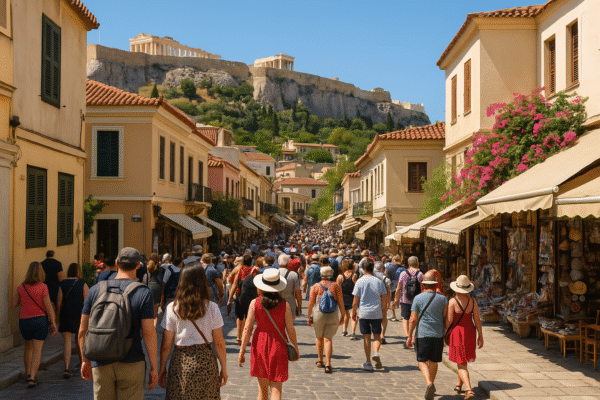The Plaka district of Athens, often described as the “Neighborhood of the Gods,” is facing unprecedented challenges from overtourism. Nestled at the foot of the Acropolis, this ancient quarter, known for its picturesque alleys, neoclassical buildings, Byzantine churches, and vibrant tavernas, is experiencing an influx of visitors that threatens to erode its historic charm and traditional way of life.
In 2025, the Greek capital is projected to welcome over 10 million tourists, up by 2 million from the previous year, according to the Greek National Tourism Organisation (GNTO). While this surge brings undeniable economic benefits, it also presents a unique dilemma: how can Athens balance tourism growth with the preservation of its most treasured cultural sites?
The Cultural Price of Popularity
Plaka’s layered heritage—spanning Classical, Roman, Byzantine, and Ottoman eras—makes it one of Europe’s oldest continuously inhabited neighborhoods. Once a quiet local enclave, it is now a bustling tourist epicenter. Tour groups, souvenir shops, and street performers crowd its narrow streets, leaving little room for daily life.
Residents speak of increasing noise, overflowing trash bins, and rising property prices. Traditional homes are increasingly being converted into short-term rental apartments, spurred by platforms like Airbnb. This trend has pushed many long-time locals out, fracturing the neighborhood’s tight-knit fabric.
A recent study by the Athens Urban Transport Organisation (OASA) found that foot traffic in Plaka increases by nearly 40% in summer months, placing tremendous pressure on infrastructure and public services.
A Booming Tourism Economy – With Uneven Benefits
Tourism now contributes more than 25% of Greece’s GDP, with Athens serving as a top entry point for millions of global travelers. While hotels, cafes, and tour operators flourish, many residents in heritage districts like Plaka are priced out of their own neighborhoods.
Data from Bank of Greece reveals that while tourism revenues hit record highs in 2024, rental prices in central Athens rose by 12%, the highest jump in the country. This disparity underscores the uneven distribution of tourism’s benefits and its unintended consequences.
Athens Takes Action: Regulating Rentals and Protecting Public Spaces
In response, city officials have rolled out a multi-pronged approach to protect Plaka’s character:
- Short-Term Rental Freeze: As of early 2025, the Ministry of Tourism temporarily froze new registrations of short-term rentals in central districts, including Plaka. Over 12,000 such properties were active in 2024 alone.
- Enforcement Units: A dedicated municipal task force now works with local police to regulate sidewalk seating, noise levels, and illegal commerce. This initiative seeks to maintain order and reduce congestion in public areas.
- Legal Challenges Against Overdevelopment: Preservation groups like ELLET (Hellenic Society for the Environment and Cultural Heritage) have initiated lawsuits against landlords converting entire buildings into tourist-only lodging. A landmark court ruling expected this September could establish new legal boundaries for commercial conversions in residential areas.
Pushing Toward Sustainable Tourism
Sustainability is now at the heart of Athens’ tourism vision. The Ministry of Culture and City of Athens are collaborating on long-term strategies that emphasize:
- Visitor dispersal to lesser-known neighborhoods like Mets, Koukaki, and Psyrri
- Timed ticketing systems at major attractions to manage foot traffic
- Cultural tourism initiatives that promote immersive, respectful visitor experiences
The city also plans to launch an awareness campaign, urging travelers to adopt responsible tourism behaviors, support local artisans, and choose licensed accommodations.
Global Lessons from a Historic Capital
Plaka’s challenges mirror those faced by other iconic destinations like Venice, Dubrovnik, and Barcelona. Yet, Athens has the opportunity to lead by example—crafting a sustainable model that values both economic growth and cultural stewardship.
Dr. Eleni Myrivili, Greece’s Special Envoy for Climate Change and Culture, recently noted:
“Tourism must be a celebration of culture, not a threat to it. Preserving Athens’ living heritage is as important as protecting its monuments.”
Looking Ahead: A Future for Both Locals and Visitors
If properly managed, tourism can be a vehicle for cultural revival rather than cultural erosion. Plaka doesn’t need to become a museum frozen in time—but it must not become a caricature either. Sustainable tourism offers a roadmap to keep the neighborhood alive, lived-in, and loved by both Athenians and admirers from around the world.
As the world’s appetite for Greek history grows, Athens must continue implementing thoughtful, community-driven policies to ensure that Plaka remains not just a destination—but a home.
For more travel news like this, keep reading Global Travel Wire

















